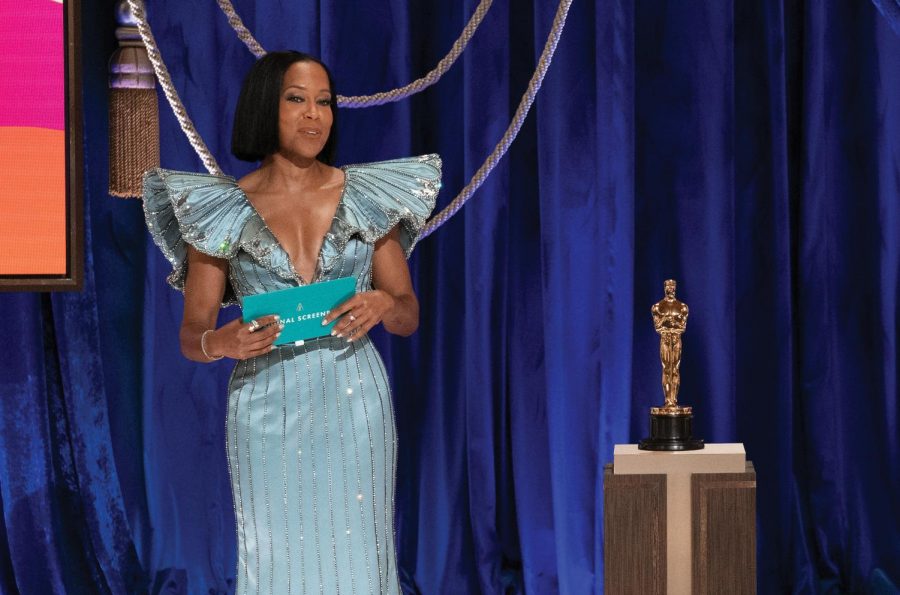An Oscars to remember for the wrong reasons
Film Critic Hunter Friesen gives his thoughts on the. 2021 Academy Awards.
Apr 29, 2021
Fitting for the year 2020, the 93rd Academy Awards was something that had never been seen before. Instead of taking place in the usual Dolby Theatre, the in-person and maskless event was hosted by Los Angeles’ Union Station.
Instead of ending things on a high note, the show’s finale – in a move that can be interpreted as cruel and exploitative – left a bad taste in everyone’s mouth. But before I dive deep into what cemented this as one of the worst Oscars ever, let’s back things up to the beginning.
Regina King kicked off the show in a cinematic long take that followed her from the red carpet to the intimate social setting within the train station hub.
Shot in a 2.35:1 aspect ratio and 24 FPS, both standard technicals for feature films, the ceremony had a much different feel to it compared to other live events. This was one of several choices made by producer Steven Soderbergh (director of the “Ocean’s” trilogy and “Magic Mike”) that led to the show’s otherworldliness feeling.
Emerald Fennell was the first winner of the night as she was awarded best original screenplay for her film “Promising Young Woman.” Following her win, in a slight upset, Florian Zeller’s adaptation of his play “The Father” won best adapted screenplay. So far, so good.
It was Daniel Kaluuya’s win for best supporting actor that signaled that things were starting to go downhill. The producers decided that speeches were going to be unrestricted and not be played off at the standard 60-second mark. This allowed for several winners, like Kaluuya, to ramble for what seemed like hours.
Another decision that derailed things was the lack of clips being shown for the nominees. In a year where the majority of people watching are unaware of the nominees, the clips play a vital role in getting people interested in a movie.
Along with honoring the best in film, the Oscars are an advertisement for those nominated. This makes it frustrating when the nominees for a category like best costume design or best cinematography, categories literally judged based on what a movie looks like, don’t show any of the work.
After the middling first 30 minutes, things ground to a halt for the next two hours. Predicted winners, like “Mank” winning best production design and “Sound of Metal” winning best sound, added to the mundane feeling that this ceremony was nothing special.
There was also a strong lack of energy within the room. None of the nominees were smiling or looked to be enjoying themselves. This is supposed to be a celebration, not a funeral.
The omission of the best original song performances sounded like a good idea to streamline everything, but in hindsight, those performances would have given this downbeat show the revitalization it desperately needed.
In fairness, there were some upsets in the technical categories that garnered excitement. Eric Messerschmidt won best cinematography for “Mank,” his first feature film. He beat out the favorited “Nomadland.” Singer/songwriter H.E.R pulled off a wild upset by winning over heavy competition in best original song. “The Trial of the Chicago 7” went home empty-handed after losing best film editing to the surging “Sound of Metal.”
Then everything came crashing down with the power of a thousand suns.
In a ludicrous decision, best motion picture, the culmination of every other category, was moved from its finale spot to being in front of the leading acting awards. Just using simple logic, one could see this was a dumb move that strips the award of its gravitas and sends a message that actors are more important than the movies they appear in.
While “Nomadland” was the heavy favorite to win, it is still an atypical Best Picture winner that deserves the spotlight just like every winner before it. But that sin wasn’t the most unforgivable one.
Best actress went to Frances McDormand in a pretty shocking fashion. This is her third lead acting Oscar, putting her in elite company with the likes of Daniel Day-Lewis and Bette Davis. Like the movie she appears in (and produced), her role as Fern in “Nomadland” is not the usual one that is rewarded by the Academy.
The final category of best leading actor was what the show (erroneously) led up to. It can’t be confirmed, but I suspect the producers wanted to end the show with this category because the posthumous Chadwick Boseman was the predicted favorite to win and his widow would have made a nice speech like she had all season.
You should never bet the farm on the Oscars, as you never know what’s going to happen. So, when Anthony Hopkins – who wasn’t present to accept the award – was announced to be the winner, everybody felt sick to their stomach. The show quickly ended and rolled to credits as everyone tried to process what we had just seen.
The Oscars are sort of like church, where you stick to tradition because it’s always been done this way and it’s always worked. It’s laughable that none of this would have happened if they had not tried to reinvent the wheel. The producers exploited Boseman to build up tension, and they have nothing to show for it.
If I were to give a grade to this show, it would be a D. The 2021 Academy Awards will go down in history as one of the most memorable, but for all the wrong reasons. The ratings were down more than 58% from the prior year, and for good reason.
From the insanely misguided and downright stupid production decisions to the jarring lack of fun, this year’s Oscars was an event that even I wished I had skipped. No one knows what the future of award shows looks like, but if they replicate anything close to what this was, I’m sure they’ll go the way of the dinosaur much sooner than later.









